“The wrong kind of people have had their say for too long and I want to remind them that somewhere in this world there is a little law and order left – to let them know in the only way their kind understands, that they can’t bribe or threaten their way and they will damn well pay dearly for every crime they commit.”
~Sheriff Buford Pusser
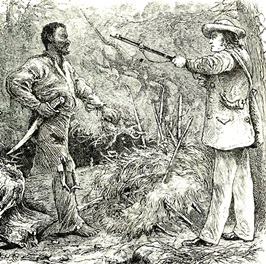
1831 – Believing himself chosen by God to lead his people out of slavery, Nat Turner led a two-day rebellion of slaves and free blacks in Southampton County, Virginia.
Turner, a slave and educated minister, planned to capture the county armory at Jerusalem, Virginia, and then march 30 miles to Dismal Swamp, where his rebels would be able to elude their pursuers.
With seven followers, he slaughtered Joseph Travis – his slave owner – and Travis’ family, and then set off across the countryside, hoping to rally hundreds of slaves to his insurrection.
During the next two days and nights, Turner and 75 followers rampaged through Southampton County, killing about 60 whites. Local whites resisted the rebels, and a state militia of 3,000 men crushed the rebellion.
Only a few miles from Jerusalem, Turner and all his followers were dispersed, captured, or killed. In the aftermath of the rebellion, scores of African Americans were lynched, even though many of them were non-participants in the revolt.
Turner himself was not captured until the end of October, and after confessing without regret to his role in the bloodshed, he was tried, convicted, and sentenced to death. On November 11, he was hanged in Jerusalem.
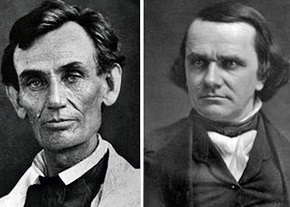
1858 – Senator Stephen Douglas of Illinois and Abraham Lincoln, a Kentucky-born lawyer and one-time U.S. representative from Illinois, began a series of seven famous public encounters on the issue of slavery.
The two politicians, the former a Northern Democrat and the latter a Republican, were competing for Douglas’ U.S. Senate seat. In the debates – all about three hours along – Lincoln argued against the spread of slavery while Douglas maintained that each territory should have the right to decide whether it would become free or slave.
Lincoln lost the Senate race, but his campaign brought national attention to the young Republican Party.
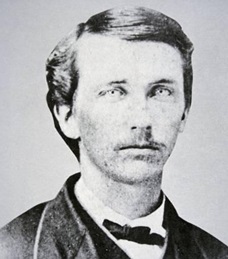
1863 – The vicious guerilla war in Missouri spilled over into Kansas and precipitated one of the most appalling acts of violence during the Civil War when Quantrill’s Raiders attacked the abolitionist town of Lawrence.
William Quantrill had been granted a field commission as a captain – even though he referred to himself as a colonel – in the Confederate army under the Confederate Partisan Ranger Act. Despite the legal responsibility assumed by the Confederate government Quantrill often acted on his own with little concern for his government’s policy or orders.
Quantrill rode into Lawrence with a force of 450 raiders. Over a four-hour period, they pillaged and burned a quarter of the buildings in town, and killed 183 men and boys, dragging some from their homes to murder them in front of their families. They burned 185 buildings, then rode back to Missouri with Union cavalry in hot pursuit.

1911 – The Mona Lisa was stolen from the Louvre in Paris.
The theft was not discovered until the next day, when painter Louis Béroud walked into the museum and went to the Salon Carré where Leonardo da Vinci’s painting had been on display for five years, only to find four iron pegs on the wall. The Louvre was closed for an entire week during the investigation.
Two years later the thief revealed himself. Louvre employee Vincenzo Peruggia had stolen the painting by entering the building during regular hours, hiding in a broom closet, and walking out with it hidden under his coat after the museum had closed. Peruggia believed the masterpiece painting should have been returned for display in an Italian museum.
After having kept the Mona Lisa in his apartment for two years, Peruggia grew impatient and was caught when he attempted to sell it to directors of the Uffizi Gallery in Florence. It was exhibited in the Uffizi Gallery for over two weeks and returned to the Louvre in January 1914.
Peruggia served six months in prison for his crime.

1926 – Chicago White Sox pitcher Ted Lyons tossed a no hitter against the Boston Red Sox in just one hour, 45 minutes at Fenway Park.
Lyons would go onto be inducted into the Baseball Hall of Fame with a 260-230 record, despite being the only Hall of Fame pitcher to have more walks (1,121) than strikeouts (1,073).

1942 – Walt Disney’s animated movie Bambi, based on the book by Felix Salten, premiered in U.S. theaters.
In June 2008, the American Film Institute listed Bambi as the third greatest animated film.
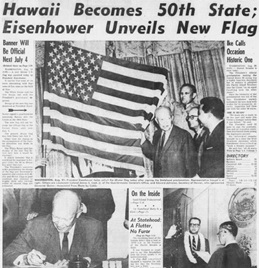
1959 – President Dwight D. Eisenhower signed an Executive Order admitting Hawaii into the Union as the 50th state.
Four months earlier, the U.S. government had approved statehood for Hawaii, and in June the Hawaiian people voted by a wide majority to accept admittance into the United States.

1961 – Patsy Cline recorded Willie Nelson’s Crazy at Bradley’s Film & Recording Studios in Nashville.
Cline was still recovering from a recent automobile accident that nearly took her life. She had difficulty reaching the high notes of the song on the original production night due to her broken ribs. A week later – on this date – she came back and recorded the lead vocal in one take.
Cline’s version is #85 on Rolling Stone’s list of The 500 Greatest Songs of All Time.
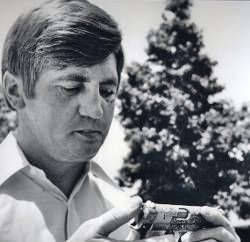
1974 – Buford Pusser, the Sheriff of McNairy County, Tennessee, from 1964 to 1970, died from injuries sustained in a one-car accident.
Pusser waged a virtual one-man war on moonshining, prostitution, and gambling along the Mississippi–Tennessee state line. His efforts inspired the Walking Tall movie trilogy.
On the day of his death, Pusser had contracted with Bing Crosby Productions in Memphis to portray himself in the sequel to Walking Tall. That evening, returning home alone from the McNairy County Fair in his specially modified Corvette, Pusser struck an embankment at high speed that ejected him from the vehicle. The car caught fire and burned.
Local speculation as to the cause of the crash included rumors – never proven – of sabotage. However, there can be no doubt Pusser had a target on his back. He had survived three earlier attempts on his life, and his wife had been murdered in 1967 while riding in a car with him.
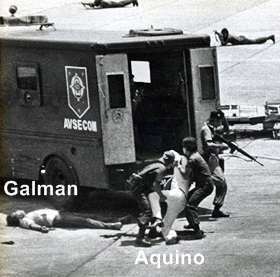
1983 – Philippine opposition leader Benigno S. Aquino Jr., ending a self-imposed exile in the United States, was shot dead moments after stepping off a plane at Manila International Airport.
Aquino, a longtime political opponent of President Ferdinand Marcos, had just landed in his home country after three years of self-imposed exile in the United States when he was shot in the head while being escorted from an aircraft to a vehicle that was waiting to transport him to prison. Also killed was Rolando Galman, who was later implicated in Aquino’s murder.
Aquino was elected to the Philippine Senate in 1967 and shortly thereafter began speaking out against Marcos’s authoritarian rule. He was imprisoned on dubious charges shortly after Marcos declared martial law in 1972.
He suffered a heart attack in prison and was allowed to leave the country two months later by Marcos’ wife, Imelda. He spent the next three years in exile near Boston before deciding to return to the Philippines.
Aquino’s assassination is credited with thrusting his widow, Corazon Aquino, into the public spotlight and running for president in 1986.
Though Marcos was officially declared the winner of the election, widespread allegations of fraud and illegal tampering on behalf of Marcos resulted in him fleeing the country and conceding the presidency to Corazon Aquino.
In addition to Galman, sixteen defendants were eventually found guilty of being involved in the assassination and were sentenced to prison.

1987 – Dirty Dancing, starring Patrick Swayze as a dance instructor at a summer resort, opened in theaters across the United States.
The film was a surprise box-office hit, earning $64 million and turning Swayze into a Hollywood star. The film soundtrack went multi-platinum and included the hit single (I’ve Had) The Time Of My Life, which won the Academy Award for Best Original Song.

1992 – An 11-day siege began at the cabin of white separatist Randy Weaver in Ruby Ridge, Idaho, as government agents tried to arrest him for failing to appear in court on charges of selling two illegal sawed-off shotguns.
An initial encounter between six U.S. marshals and the Weavers resulted in a shootout and the deaths of Deputy U.S. Marshal William Francis Degan, and the Weavers’ son Samuel, age 14.
In the subsequent siege of the Weaver residence, led by the FBI, Weaver’s 43-year-old wife Vicki was killed by FBI sniper fire. All casualties occurred on the first two days of the operation.
The siege and stand-off were ultimately resolved by civilian negotiators, with the surrender and arrest of Kevin Harris on August 30, and the surrender of Randy Weaver and the surviving Weaver children the next day.
Randy Weaver and Kevin Harris were subsequently arraigned on a variety of federal criminal charges, including first-degree murder over the death of Deputy U.S. Marshal Degan.
Harris was acquitted of all charges, and Weaver was acquitted of all charges except for the original bail condition violation for the arms charges and for having missed his original court date. Fined $10,000 and sentenced to 18 months in prison, he was credited with time served plus an additional three months, and was then released.
The Senate Subcommittee on Terrorism, Technology and Government Information held fourteen days of hearings, ending on October 19, 1995. The subcommittee report on Ruby Ridge criticized the rules of engagement as unconstitutional.
The surviving members of the Weaver family filed a wrongful death suit for $200 million. In an out-of-court settlement, the federal government awarded Randy Weaver $100,000 and his three daughters $1 million each.
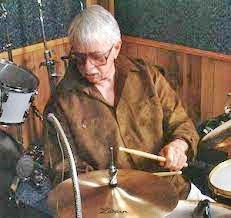
2008 – Session drummer Buddy Harmon died from congestive heart failure at the age of 79.
Based in Nashville, Harman played drums on over 18,000 sessions, including Crazy (Patsy Cline), Oh, Pretty Woman (Roy Orbison), Rockin’ Around The Christmas Tree (Brenda Lee), King Of The Road (Roger Miller), Ring Of Fire (Johnny Cash), Battle of New Orleans (Johnny Horton), Little Sister (Elvis Presley), Coal Miner’s Daughter (Loretta Lynn), Stand By Your Man (Tammy Wynette), and Cathy’s Clown (Everly Brothers) … and that is just a tiny sampling!
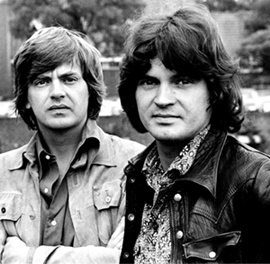
2021 – Don Everly, one half of The Everly Brothers alongside his younger brother Phil, died at the age of 84 from undisclosed causes.
The duo was highly influential with the music of the generation that followed them. Many of the top acts of the 1960s were heavily influenced by the close-harmony singing and acoustic guitar playing of the Everly Brothers, including the Beatles, the Beach Boys, the Bee Gees, and Simon & Garfunkel.
In 2015, Rolling Stone ranked the Everly Brothers No. 1 on its list of the 20 Greatest Duos of All Time. They were inducted into the Rock and Roll Hall of Fame as part of the inaugural class of 1986, and into the Country Music Hall of Fame in 2001.
Don was inducted into the Musicians Hall of Fame and Museum in 2019, earning the organization’s first Iconic Riff Award for his distinctive rhythm guitar intro to the Everly’s massive 1957 hit Wake Up Little Susie.
Compiled by Ray Lemire ©2023 RayLemire.com / Streamingoldies.com. All Rights Reserved.
Good Morning Ray, Your opening quote reminded me of attending the 1st presidential primary in NH the year Clinton won, whatever year that was. The reason being that Tom Laughlin & his wife Delores Taylor were there as he was a presidential candidate. He wasn’t going to win but he impressed me with what he had to say so that after getting home I re-watched the Billy Jack movies. Still have pass outs from all the candidates from that year. I have been in Stephen Douglas’ birth place in Brandon, VT. The 1st time was during an underground railroad tour! The house is now used as a museum & welcome center. Saw Bambi twice at the movie theatre. 1st time with my brothers Ernie & David & again when I was older with my brother Billy & I cried both times but love the movie. Good movies, musicians, sports, art & Hawaii (only place I’ve wanted to go to that wasn’t to see people but have learned I have a 1st cousin’s son that lives there. Trying to keep it short but life is also filled with “We Are Right” times (WAR) 🙁 Have a good day Ray & thanks for the reminders. 🙂 Lee
Thanks, Lee! 🥰
I have always been impressed with the way you tie the events of the day with personal memories of your own!
Always learning new details about the history I know and new info about what I don’t.
Crazy, Dirty Dancing, Walking Tall, Bambi…serious icons and of course the usual murder and mayhem that always mark history.
As Bob Hope would have said, “Thanks for the memories.”
As Ray Lemire would say, “Thanks for the comments, Mary Helen!” 🥰
A mix of good & bad today. Patsy Cline, the Everly’s, and Dirty Dancing are all favorites., and what a resume for Buddy Harmon. Nat Turner had good reason to revolt, but his method did not help his cause. Ruby Ridge was a fiasco, and Quantrill was a terrorist, not a soldier. And what a change in baseball over the years. very rare for a pitcher to throw a full game, and even with the pitch count games are still much longer.
Thanks, Pat! You nailed it on all counts! 🥰
I cringed just a bit Ray reading the details of physical mayhem in days gone past. With Bambi, not so much.
RIP Patrick Swayze, who BTW had a sister named Bambi.
Thanks, Jr. I admit some of this stuff is not pleasant but hey, it happened and my job is to report it. 🙂